Updated October 2020
Running a law firm isn’t what it used to be until 10 years back.
Today, you need more than your firm’s long-standing reputation, a pack of charismatic attorneys, or your offices across multiple states.
The legal landscape today is highly competitive and much more digital than it was a decade ago.
In legal circles these days, it’s fairly common to see tablets replacing black briefcases, scanning mobile apps taking the place of copier-scanners, and home offices taking over mahogany-fitted meeting halls.
Until a few years back, experts used to accuse how little the legal industry has changed in the last 50 years.1
But a lot has changed since then. For example, the legal tech market saw a record investment of around USD 1.2 billion in 2019.2
And considering the growing number of law offices becoming more virtualized—thanks to the 2020 pandemic—this trend is expected to increase even more in the future.
On top of managing client relationships and keeping tabs on important court dates, your firm should now have access to digital-friendly, time-efficient tech solutions to compete with other practitioners vying for the same set of clients.
If you want your law firm to outsmart your competition in today’s competitive legal marketplace—you will have to work smarter, not harder. You have to embrace technology to win over the case of better marketing, higher productivity, and better client service for your firm.
In this post, we’ll look at:
- 3 things to know about choosing the right apps for your firm
- What types of apps should law firms consider?
- The 11 best apps for lawyers to improve the client experience and work more flexibly
See how these four law firms adapted their operations to work from anywhere—while still providing a great client experience. Download the free case study playbook!
3 things you should know about choosing the right apps for your law firm
Can technology really help law firms become better at what they do?
Absolutely—if you were to look at how new technology like artificial intelligence (AI) can save up to 90% of your law firm’s time by automating (without compromising on accuracy) low-value legal work like contract review.3
A research by McKinsey goes further in validating that idea. According to their research report, most law firms can automate over 23% of their manual legal process using existing technology—a witness to the sea of change technology can bring to the law firms.4
Even social media—which is sometimes looked down as being frivolous—is known to help tech-savvy lawyers get a steady flow of client referrals.5
Sound unbelievable? Who in the world has the time to Like your Facebook posts when they’re filled with a raging fire to sue their neighbors—right?
But that’s just one example of how far technology can go in helping your law firm yield more results with the relative ease of a push of a button.
It’s also critical for the legal world to catch up with the fast-pacing, technology-driven world. Today, most attorneys work outside of their offices and run on very hectic schedules.
On the other hand, clients who pay high retainer fees expect 24/7 access to their legal teams—especially with upcoming high-profile projects and high-impact lawsuits.
Today’s law firm is all about enabling the Virtual Law Office—a digital-driven work arrangement that allows attorneys to connect effortlessly with their colleagues and clients via phone, text messaging, or video calls from any location (airport, train, or a vacation beach in Bali) using any device of their choice.
Assuming that you are serious about improving your law firm’s efficiency, here are three things you should consider about choosing the right app for your law firm:
1. Is the app easy to use?
Most law firms (understandably) don’t look to fancy new technology first to solve their problems. In a survey of 700 legal professionals from law firms, legal departments and business services firms across Europe and the US, Wolters Kluwer Legal & Regulatory found that legal professionals resist technology because they think they don’t have the skill or the money to justify embracing tech for their day-to-day operations.6
And it makes sense—tech is notoriously difficult to regulate, and we’re talking about a profession that’s all about regulation.
Thankfully, most app makers are aware of this—not just in legal tech, but in general. The majority of productivity and organization apps today are built in a way that anyone, tech-savvy or not, can dabble with it.
But just to make sure you don’t invest in an overly complicated app that ends up not being worth your time, make sure you look at ease of use as one of your core requirements when you’re shopping for new software.
Is the app easy to understand and use—without you needing to hire an IT team or consultant to help you get started?
Your law firm’s bandwidth is already stretched thin with paperwork and client demands. Adding a technologically demanding app will only deepen the chaos further.
A well-built app, on the other hand, can help your law firm provide a 24/7 client experience—even without being online 24/7.
Learn how to build a remote-friendly legal practice in this in-depth guide.
2. Less is more
A law firm (generally) doesn’t need as many apps as, say, a tech company building the next Facebook or Tesla.
Which is good news for you, since it means you don’t have to invest a ton of money every month into software.
Resist the temptation of investing in too many tools that come with a ton of “feature creep” that you’ll never end up using. Choose versatile tools, not one-trick-ponies.
If you fall into the trap of buying a different app for every single one of your law firm’s processes, you’ll soon have an expensive stack of software—and a big red underline in your financial audit.
The danger compounds beyond financial issues when you choose the wrong apps. Imagine toggling between five different apps constantly every day, managing them, copying and pasting data between each one, and so on. It’s counterproductive to efficiency and adds bloat to your workload.
Instead, you should focus on procuring a few good apps that consolidate the best features and complement your law firm’s processes.
A good rule of thumb when deciding between apps designed for legal teams? Look for a clean user interface, simple pricing, and excellent customer support.
3. Does it help (or hurt) collaboration?
By definition, technology is an enabler of efficiency—it’s supposed to bring people together for better collaboration.
But if you happen to choose a clunky app that’s difficult to use, you’ll notice that the opposite is true. In some cases, you might even need a dedicated IT team on standby to supervise these apps (and its users) ‘round the clock.
That’s…a waste of everyone’s time. These kinds of apps will end up creating bottlenecks in your workday and prevent you from dedicating time to your clients.
So, it’s usually a good idea to choose communication-friendly apps that help your team stay in touch with each other across different channels.
This is especially true as law offices are catching up with the rest of the world in working from anywhere and everywhere.
What types of apps should law firms consider?
Just because TikTok exists doesn’t mean you too have to upload videos showing your team’s dance moves.
You just need apps that are specifically built to solve your law firm’s problems.
Keeping that in mind, we’ve shortlisted top 11 best apps for lawyers under the following five categories:
- Best communication apps
- Best timekeeping apps
- Best productivity apps
- Best dictation apps
- Best case management apps
While being better at communication and productivity are broadly beneficial for all kinds of businesses, the rest of the apps in the above categories are specific to an average law firm’s requirements.
11 best apps for lawyers to improve the client experience and work more flexibly
There are plenty of software solutions that can help you become more efficient in your internal processes or increase productivity.
Below, we have curated top 11 useful apps for lawyers that can help your firm become better at everything.
Best communication apps for lawyers
1. RingCentral
While attorney-client privilege is regarded highly in legal circles, we rarely hear about lawyers’ privacy discussed with the same level of reverence.
And that’s one area where RingCentral serves you well. With RingCentral app, you can get on a phone call with clients using their private smartphones while masking your real cell phone number. See MHP&S Law did it.
That means you don’t need two phone connections to manage your personal and work-related phone calls. You can give the same virtual number to all of your clients and not have them know your personal mobile phone number—ever.
That’s just one aspect of using RingCentral for your law firm.
You can use the RingCentral app for team messaging in order to manage caseloads, collaborate on projects, and share files within the app:

RingCentral combines different communication channels into one app and enables your team to be productive while working remotely.
You can also switch a meeting from phone to computer (and vice versa) or from a phone call to a video call (and vice versa)—depending on what your requirements are.
You can also integrate RingCentral with several third-party apps to automate your workflows or track your team’s billable hours. With so many features packed into one, RingCentral is one of the best organization apps for lawyers.
Best suited for: Law firms that are going through a growth period or facing problems communicating across teams. RingCentral is great for firms that have multiple office locations or whose attorneys are often on the go and need to collaborate effectively over videos or phone calls.
Use this calculator to see roughly how much your firm can save by using RingCentral to support your team’s communication with each other—and clients.
🕹️ Get a hands-on look at how legal practices are providing an awesome client experience and getting work done while away from the office using RingCentral. Check out a product tour:
2. NetDocuments
NetDocuments is a document management system that helps you organize your firm’s important case files, emails, or any other confidential documents:
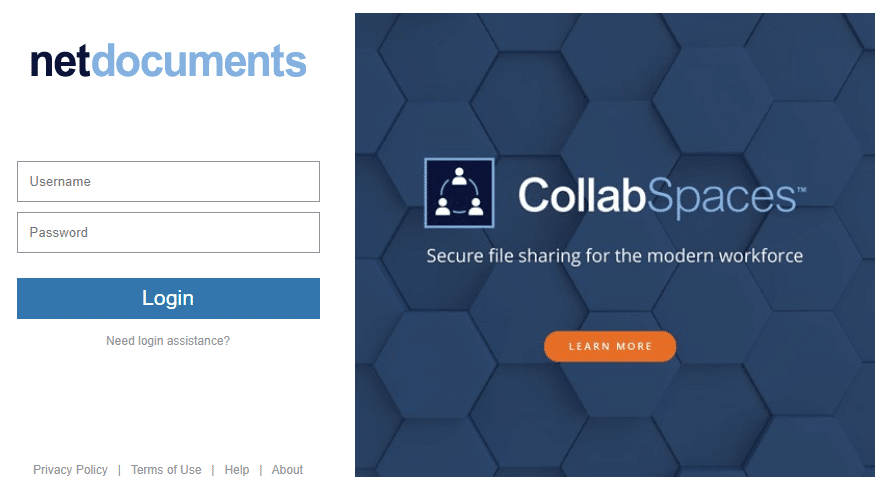
NetDocuments comes with a rich set of features that enable your team to collaborate tightly. For instance, it integrates with Microsoft 365, Microsoft Outlook, and Adobe Acrobat to offer you a seamless flow of data across these platforms.
It also allows you to securely share case files with your team members as well as others outside of your firm. You can use NetDocuments’ ‘Search’ feature to help you retrieve important information archived in your data repository.
With NetDocuments app, you can avoid the confusion of two or more people working on the same document. For example, the Check-In feature in NetDocuments ensures that other people in your team can’t overwrite your work unless you “check out” of it.
Best-suited for: NetDocuments is a life-saver for law firms that have a team size of more than 5–6 lawyers since a firm of that size quickly outgrow their manual processes.
Best timekeeping apps for lawyers
3. TimeMiner
Legal practice is billable in hours, which is why it’s important to track every minute of your time to make sure you are compensated for your expert counsel. It’s why timekeeping software programs are one of the must-have apps for lawyers.
TimeMiner, one of the best time-tracking apps for lawyers, allows you to do just that—and then some. For instance, TimeMiner retroactively calculates your billable hours based on the phone calls, texts, and emails with your clients and creates entries for every activity you log in the app:

A great thing about TimeMiner is that you can use it to easily find past billable calls from your phone records. For example, TimeMiner integrates with RingCentral to automatically create time entries for your RingCentral calls and texts. Never miss out on another billable minute!
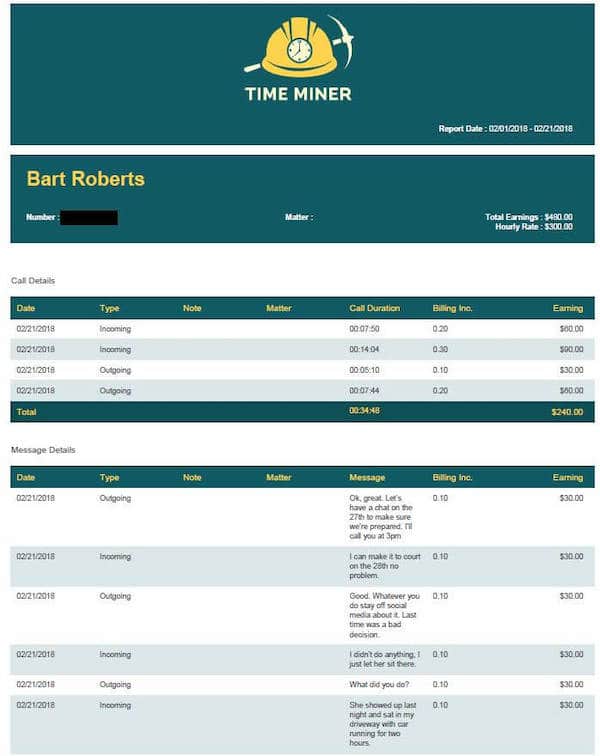
Similarly, TimeMiner goes back in time and tracks billable emails from your Outlook or Gmail accounts.
Best suited for: TimeMiner is best for busy law practitioners or small law firms that need an easy way to keep track of billable hours for multiple clients.
4. Toggl
Toggl makes your time-tracking as cool as getting an ice-cream treat:
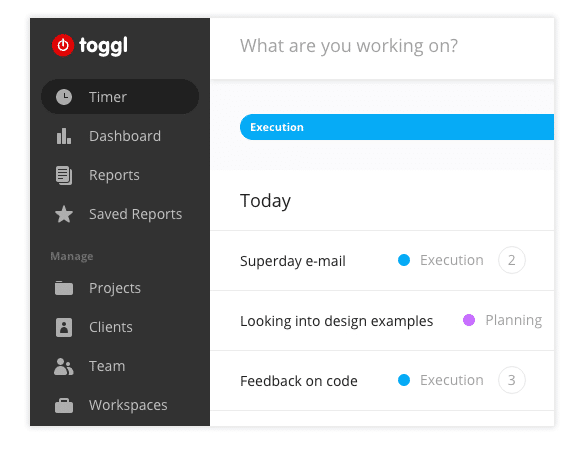
You don’t have to get any extra training or overcome a learning curve to use Toggle. The app is extremely easy to use—you just have to click the “start” button when you want to track your time and hit “stop” when you’re done.
One of its other features includes automatically tracking every app or website that you would use for more than 10 seconds and converting that data into a new time entry.
Basically, it compensates for your forgetfulness with intelligent automation. If you don’t need the entry, you can always delete it from the app.
And because we are living in an age of calendar invitations, Toggl integrates with your calendar apps to track the time you spend on each calendar event.
With Toggl, it’s impossible to let any billable minute slip away in your invoicing while its reporting feature helps you see where you are spending your precious time.
Best suited for: Toggl is great for law firms of all shapes and sizes. It offers a free plan for teams while also gives scalable solutions to large businesses that have complex time tracking and project needs.
5. TimeCamp
Having a good time tracker, especially if you charge your clients per hour, is a must-have. If you want to stop guessing how many hours a week lawyers work, check out TimeCamp.
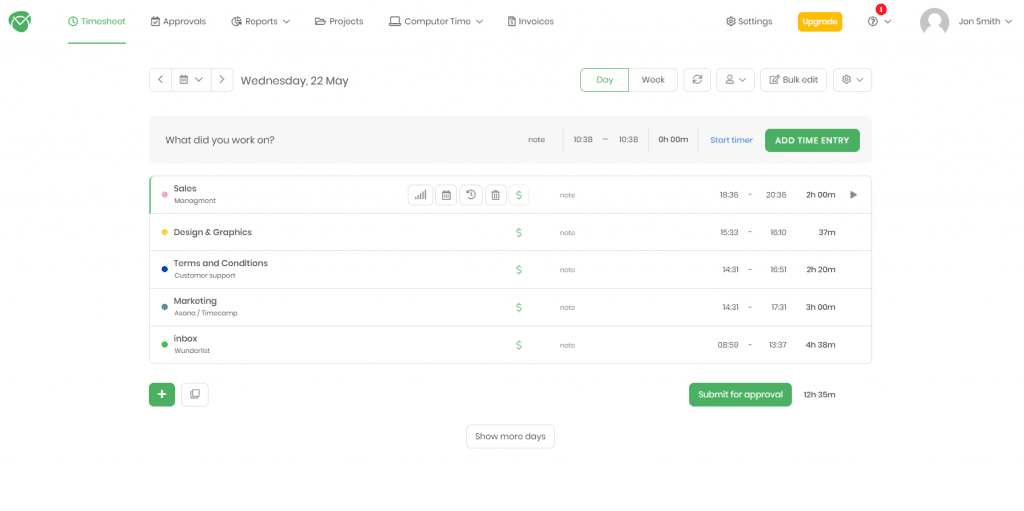
No more struggling with manual hours tracking as TimeCamp does it for you seamlessly. Its desktop app logs hours automatically and assigns them to particular projects (in lawyer’s case—clients). What’s more, you can invoice your clients based on how much time you logged for their case.
TimeCamp is easy to use because it works in the background, which is perfect if you want to limit the distractions and focus on work entirely.
Besides the billable hours, it also tracks non-billable ones to make you sure each client is billed correctly and you’ll get paid for your work fairly.
TimeCamp offers a wide range of integrations. Use the calendar one to track time spent on meetings with clients. Connect it with your favorite project management tool and import the tasks or track time straight from it with a built-in button. Integrate it with an accounting software to streamline the invoicing payroll processes.
A free TimeCamp version offers unlimited users, projects, and tasks. Paid plans are affordable, with the lowest prices on the market, and are packed with features like budgeting, custom reports, attendance tracking, and many more.
Best suited for: Law firms of all sizes and freelance lawyers. No matter what plan you choose—free or paid—TimeCamp will deliver the highest quality of time tracking to streamline the time-related processes of your practice.
Best productivity apps for lawyers
6. Scanbot
Legal work demands a ton of paperwork. And if you were to carry the physical burden of all your important documents, you would soon develop chronic back pain.
But you can save that expensive visit by using a tool like Scanbot—a mobile-based document scanning app:
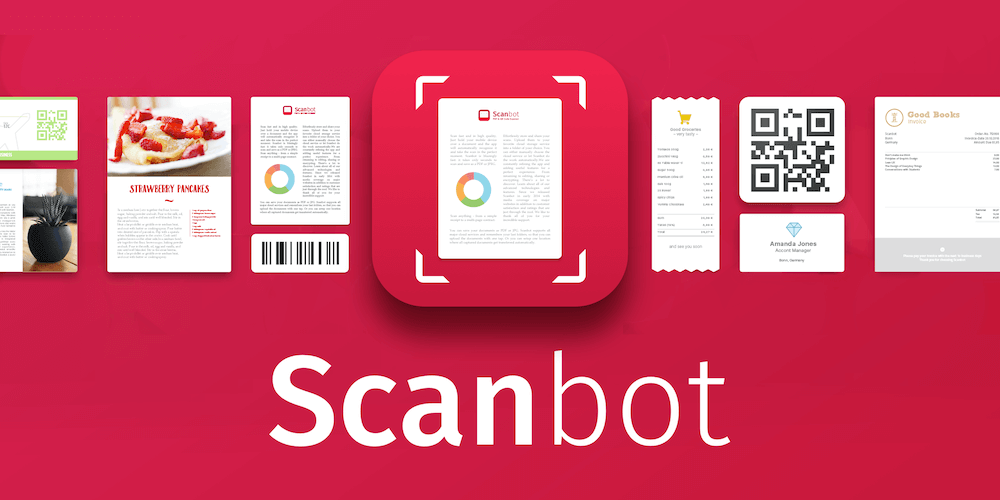
Scanbot is user-friendly and compatible across multiple devices like Android, iPhone, and iPad. With Scanbot, you can scan case files, documentary evidence, sketches, deeds, receipts, QR codes, and barcodes.
Once you scan the document of your choice, the app allows you to crop and adjust the scanned copy as per your requirement. Scanbot lets you save your documents in multiple file formats like pdf or jpg.
Scanbot’s integration with cloud storage platforms like Evernote, Dropbox, Google Drive, iCloud, and OneDrive allows you to upload your scanned document directly to your cloud storage.
Best suited for: For law firms of all shapes and sizes—since scanning is a pretty standard requirement for everyone in the legal practice.
7. Fantastical
At its core, Fantastical is a calendar app for keeping up with important dates. But the app does more than just helping you schedule events or set reminders:
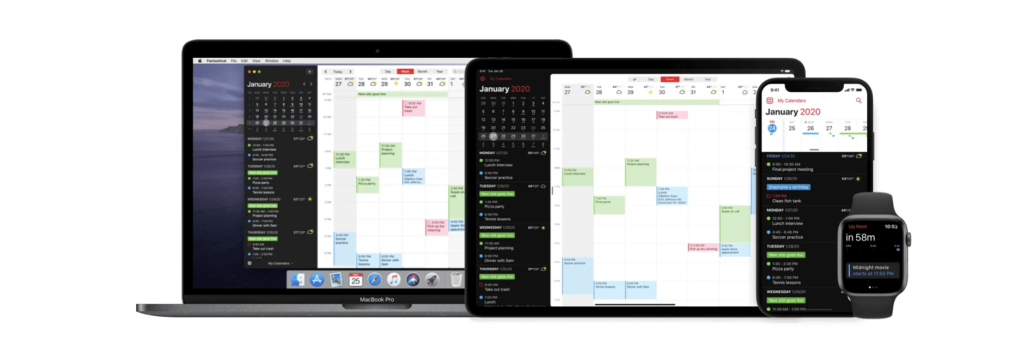
For example, Fantastical takes the confusion out of planning events or coordinating multiple invitees to agree on an event’s time by allowing you to suggest multiple times for any event.
Design and complete your projects directly in Fantastical. Add tasks alongside calendar events and complete them when you’ve accomplished the task. Tasks notify you when they’re due, and overdue tasks carry over to future dates. You’ll never forget about a task again.
You can also create and complete tasks directly within Fantastical—alongside your calendar events. It’s like creating a list of reminders or to-dos that you can check-off once you’re done with the actual task.
The app’s user interface is absolutely gorgeous and makes it easy for you to attach files or images directly from Fantastical to your iCloud, Google, or Exchange events and across all your devices.
The only downside is, Fantastical is only available for Apple devices—Mac, iPhone, iPad, and even iWatch.
Best suited for: Mostly for mid-sized law firms who want a fun quotient to their regimented schedules. As one of the best iPhone apps for lawyers, Fantastical is great for law firms who are fanatic about Apple products.
Best dictation apps for lawyers
8. Otter.ai
From recording eyewitness testimony to documenting court hearings, law firms have huge requirements for transcribing spoken words into legal documents. And it can be tedious work to listen to audio recordings repeatedly and manually dictate them into written texts.
Thankfully, with a speech-to-text app like Otter—you don’t need to hire a full-time dictation specialist or pay a hefty price to a transcription agency.
Otter sits in your smartphone as a downloaded mobile app or and can convert all of what is being uttered into text in real-time!
You can also play back the recorded audio at different speed levels, add images or other multimedia content directly into the transcriptions, and important audio/video files for conversion.
Granted—Otter is not perfect. It doesn’t transcribe everything correctly and you have to proofread the transcription for accuracy’s sake. The makers behind Otter app are cognizant of this fact, which is why the app allows you to edit transcriptions directly within the app.
This process is still way better than having to manually go through the same recording multiple times and trying to get everything right.
Otter can recognize different voices and differentiate the notes while it converts the speech into text.
Best suited for: For smaller law firms that don’t have the budget to hire a full-scale transcription agency.
9. Dragon
If Otter is too small for your use case of converting a huge pile of audio recordings into legible text, just let the Dragon save you.
Just like Otter, Dragon is a cloud-based speech recognition app that can help you save you time and money by transcribing complex legalese into text documents:
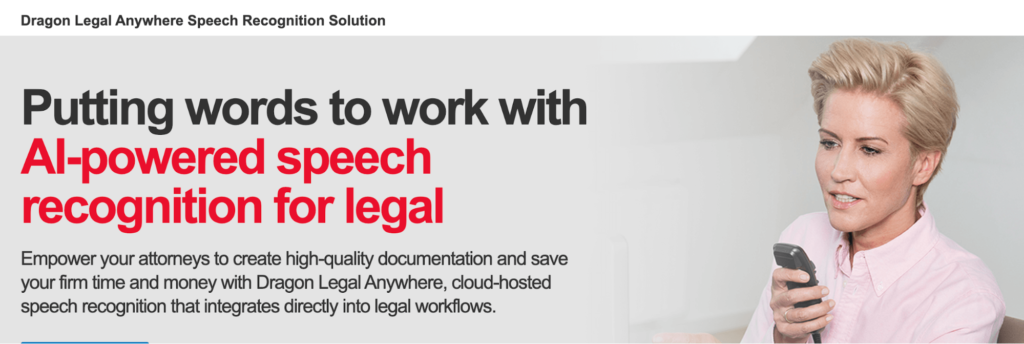
Dragon is a better heavy-hitter than Otter because it has a specialized transcription app called the Dragon Legal Anywhere.7
The app integrates directly into legal workflows, specializes in legal vocabulary (which means more accuracy), and works better even for users with non-native English accents.
Owned by Nuance Communications—a veteran in the sector of artificial intelligence (AI) and speech recognition—Dragon app leverages its conversational AI capabilities to learn a users’ speech patterns and documents audio recordings more naturally.
Best suited for: For all kinds of law firms. Dragon offers affordable pricing while keeping its offerings feature-packed.
Case management apps for lawyers
10. Clio
Clio is a law practice management software (LPMS)—designed specifically to solve the case management problems of law firms of all sizes:
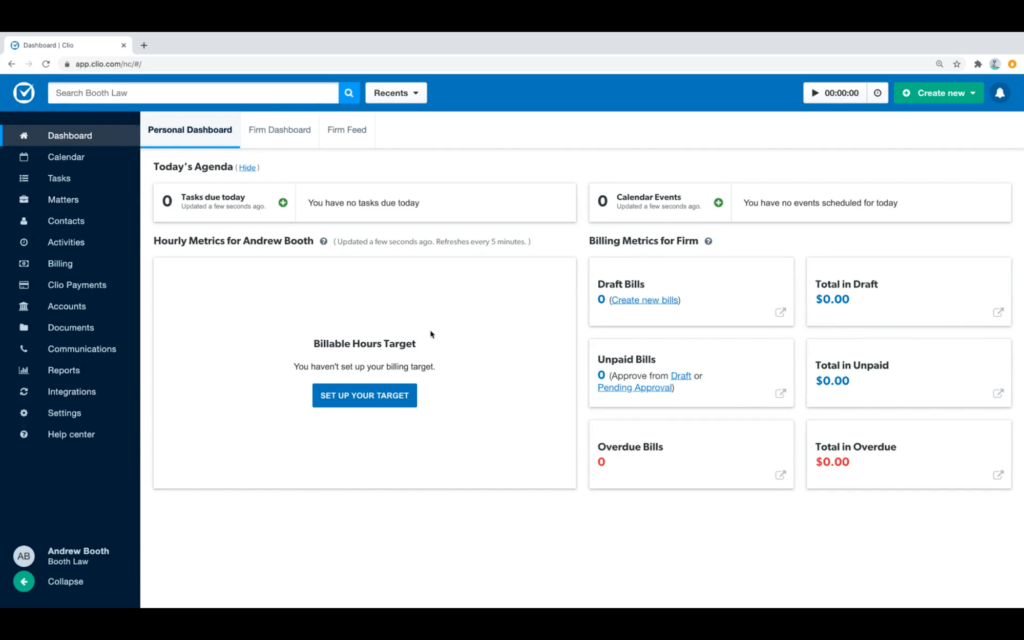
Clio Manage is a user-friendly, innovative, and powerful software that helps legal professionals organize their case details, share documents, manage client information, set schedules, create workflows, and streamline their day to day operations—all under the same roof.
Clio’s strongest forte lies in the integrations it offers with a host of other legal tech apps that are popular among legal practitioners. For instance, Clio features an extensive App Directory and an Open API that lets you integrate Clio with a range of other applications that are important for your firm’s operations.
You can also use Clio Manage as part of Clio Suite—at an additional price—which offers another app called Clio Grow (customer relationship management software) that lets you manage your growing base of clients.
Best suited for: For middle- to large-scale law firms that are considering scaling their operations. Clio extends its services beyond just case management, which means it expects law firms to grow and hence offers a CRM tool to help them manage their growing needs.
11. MyCase
MyCase is yet another popular all-in-one LPMS app that enables you to organize your case management requirements in an efficient and scalable manner:
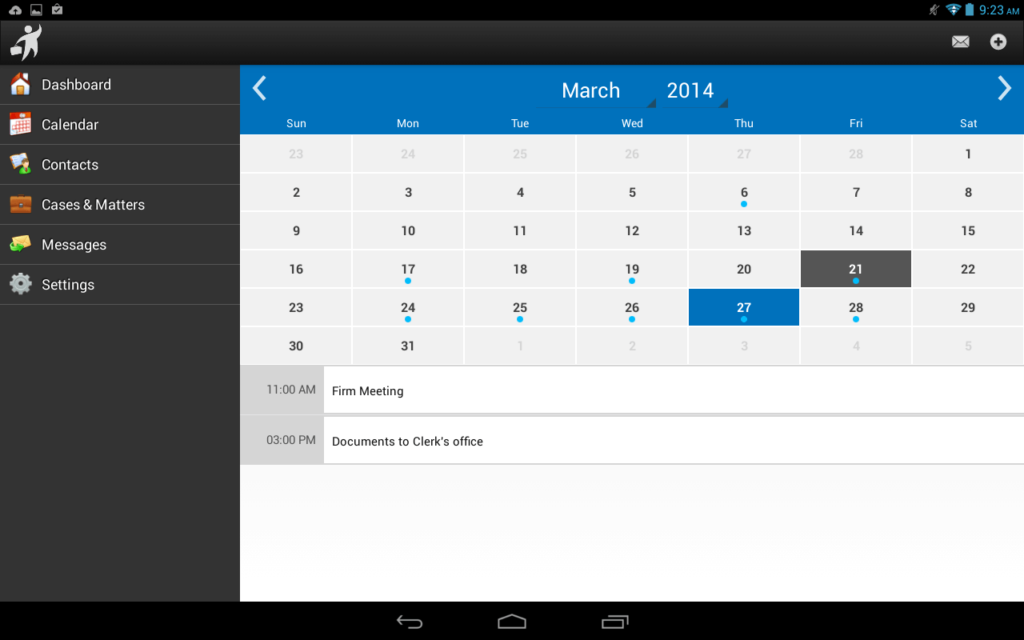
MyCase comes bundled with a complete set of case management tools that lets you manage your documents, emails, contacts, cases, calendars, and invoices in a single location.
Despite its overwhelming-sounding set of tools, MyCase is actually very easy to use. Thanks to MyCase’s easy user interface (UI), you don’t have to spend a lot of time learning how to use the app or be an expert to exploit its full range of functionalities.
MyCase makes it easier for you to increase your team’s efficiency and take on complex cases without losing your focus.
One of MyCase’s highlight features is the ability for you or your colleagues to add Notes in the cases. This allows your team to add individual notes to a developing case so that there’s more context and history for everyone in your team to view.
Best suited for: For small and medium law firms that don’t want to buy a separate calendar or invoicing app.
With so many apps for lawyers, you have a strong case for productivity
With the growing landscape of legal apps for lawyers to help you improve your team’s productivity and efficiency, it’s a great time to take advantage of the amazing benefits that these tech apps offer.
We want to end by saying this—don’t be overwhelmed by the thought of having to try them all at once though. Try a few of them first to see the difference they make in your firm’s everyday productivity. You can add more apps to your tech repository later as your use cases grow.
1lawtechnologytoday.org/2014/12/smart-startups
2appinventiv.com/blog/evolution-of-legal-technology
3industryarc.com/Report/18534/legaltech-artificial-intelligence-market-research-report.html
4americanbar.org/groups/law_practice/publications/techreport/ABATECHREPORT2018/Marketing
5public.tableau.com/profile/mckinsey.analytics#!
6journal.iaccm.com/contracting-excellence-journal/dilemma-of-legal-firms-lagging-behind-technology-can-pick-your-pocket-are-you-future-ready
7nuance.com/dragon/business-solutions/dragon-legal-anywhere.html
Originally published Oct 27, 2020, updated Jun 19, 2024





